

Fortuna. Fortuna (Latin: Fortūna, equivalent to the Greek goddess Tyche) was the goddess of fortune and personification of luck in Roman religion.
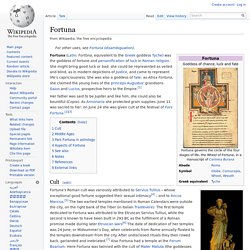
She might bring good luck or bad: she could be represented as veiled and blind, as in modern depictions of Justice, and came to represent life's capriciousness. She was also a goddess of fate: as Atrox Fortuna, she claimed the young lives of the princeps Augustus' grandsons Gaius and Lucius, prospective heirs to the Empire.[1] Her father was said to be Jupiter and like him, she could also be bountiful (Copia). As Annonaria she protected grain supplies. June 11 was sacred to her: on June 24 she was given cult at the festival of Fors Fortuna.[2][3] Cult[edit] Heraldic Fortuna in the arms of Glückstadt. An oracle at the Temple of Fortuna Primigena in Praeneste used a form of divination in which a small boy picked out one of various futures that were written on oak rods. She is found in a variety of domestic and personal contexts. Vatican, Rome, Italy.
Fortuna for PDF - aryada026.pdf. Full text of "The tradition of the goddess Fortuna in Roman literature and in the transitional period" Fortuna - Goddess of Luck. Fortuna In Roman mythology, Fortuna (Greek equivalent Tyche) was the personification of luck, hopefully of good luck, but she could be represented veiled and blind, as modern depictions of Justice are seen, and came to represent the capriciousness of life.Fortuna had a retinue that included Copia among her blessings.
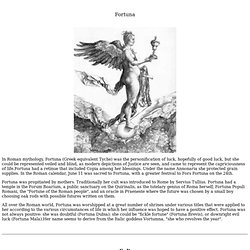
Under the name Annonaria she protected grain supplies. In the Roman calendar, June 11 was sacred to Fortuna, with a greater festival to Fors Fortuna on the 24th. Fortuna was propitiated by mothers. Traditionally her cult was introduced to Rome by Servius Tullius. All over the Roman world, Fortuna was worshipped at a great number of shrines under various titles that were applied to her according to the various circumstances of life in which her influence was hoped to have a positive effect. Cult Fortuna's Roman cult was variously attributed to Servius Tullius Ð whose exceptional good fortune suggested their sexual intimacy - and to Ancus Marcius. Middle Ages ShareThis. Goddess Symbols of Fortuna. Goddess Symbols of Fortuna Fortuna was a major deity among the ancient Romans.
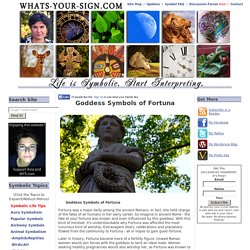
In fact, she held charge of the fates of all humans in her early career. How did the Roman goddess Fortuna became a goddess. Fortuna in Roman mythology, the personification of chance or luck is the equivalent of the Greek goddess Tyche.
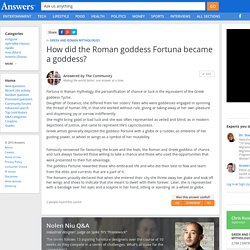
Daughter of Oceanus, she differed from her sisters' Fates who were goddesses engaged in spinning the thread of human life, in that she worked without rule, giving or taking away at her own pleasure and dispensing joy or sorrow indifferently. She might bring good or bad luck and she was often represented as veiled and blind, as in modern depictions of Justice, and came to represent life's capriciousness. Greek artists generally depicted the goddess Fortune with a globe or a rudder, as emblems of her guiding power, or wheel or wings as a symbol of her mutability. Famously renowned for favouring the brave and the fools, the Roman and Greek goddess of chance and luck always favoured those willing to take a chance and those who used the opportunities that were presented to their full advantage. FORTUNA, Roman Mythology Index. The Magic of the Horseshoe: Fortune And Luck: II. The Roman Goddess Fortuna.
Sacred Texts Misc Texts Index Previous Next The worship of the Goddess of Chance, Fortuna, was introduced among the Romans from Greece during the reign of Servius Tullius, and soon became very popular.
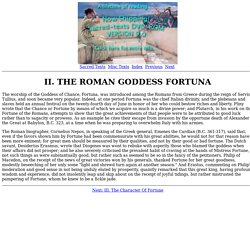
Indeed, at one period Fortuna was the chief Italian divinity, and the plebeians and slaves held an annual festival on the twenty-fourth day of June in honor of her who could bestow riches and liberty. Pliny wrote that the Chance or Fortune by means of which we acquire so much is a divine power; and Plutarch, in his work on the Fortune of the Romans, attempts to show that the great achievements of that people were to be attributed to good luck rather than to sagacity or prowess. As an example he cites their escape from invasion by the opportune death of Alexander the Great at Babylon, B.C. 323, at a time when he was preparing to overwhelm Italy with his armies. Next: III. The Magic of the Horseshoe: Fortune And Luck: III. The Character Of Fortune. Sacred Texts Misc Texts Index Previous Next Of all the pagan deities, Fortune was the most absolute and the most universally worshiped; for she kept all men at her feet, the prosperous through fear and the unfortunate through hope.

She was also an eccentric goddess, not only favoring the brave, according to the familiar maxim of Terence, but likewise being decidedly partial to fools, if we may believe another classical saying, Fortuna favet fatuis. And again, as an ancient poet wrote, Legem veretur nocens, Fortunam innocens. The satirist Juvenal said that, if men were discreet, Fortune had no power over them. When she entered Rome she folded her wings as a sign that she wished to remain there; and, as has been aptly remarked, she is there still, for the modern Roman is as firm a believer in luck, whether good or bad, as was the Roman citizen two thousand years ago.
"Why was Fortune made a goddess? " Pliny, in discoursing about the religious beliefs current in his time, says:-- Next: IV. Roman Goddess Fortuna *** The Temple of FortunaShe had a temple dedicated to her that was situated at the foot of the Capitoline Hill in ancient Rome.

This was the area of the Forum Boiarum that housed a market specialising in agricultural goods and livestock. Sacred zones were interspersed within the market area of the Forum Boiarum and in a sacred precinct were the twin temples of Fortuna and Matuta (the goddess Aurora). The twin temples were established by Servius Tullius in the sixth century BC.
The temple of Fortuna represented the goddess of luck and chance. The Temples of Aurora and Fortuna were destroyed by fire but rebuilt by Marcus Furius Camillus in 396 B.C. Encyclopedia Britannica. TYCHE : Greek Goddess of Fortune & Luck. The Roman Goddess Fortuna. Fortuna, who is equated with the Greek goddess Tyche, is an ancient goddess of the Italic peninsula.

Her name means "fortune. " She is associated with both bona (good) and mala (bad) fortune, chance, and luck. Mala Fortuna had an altar on the Esquiline; King Servius Tullius (known for his building projects in Rome and reforms) is said to have built Bona Fortuna's temple in the Forum Boarium+. In her depictions, Fortuna may hold a cornucopia, sceptre, and the rudder and helm of a ship. In this picture, she is shown with her feet balancing on a globe of the world. Sources for Fortuna are both epigraphic and literary. One commonly mentioned cognomen of Fortuna is Primigenia, first born (probably, of the gods), which is thought to attest to her great antiquity. Another list comes from Transactions of the Lancashire and Cheshire Antiquarian Society Vol.
Fortuna Dame Fortune Lady Luck Fate goddess luck goddess Latin Goddess Roman goddess pagan gods and goddesses Roman Gods and goddesses wiccan wicca paganism pagan Thalia Took Dame Fortune smile tear a s.